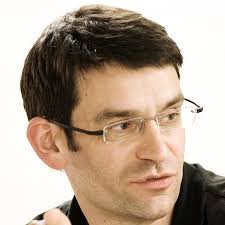 This week’s Extraordinary Business Book Club podcast episode features Giles Colborne, one of the world’s leading experts in user experience. His book Simple and Usable is, as you might expect, utterly beautiful from a design perspective.
This week’s Extraordinary Business Book Club podcast episode features Giles Colborne, one of the world’s leading experts in user experience. His book Simple and Usable is, as you might expect, utterly beautiful from a design perspective.
I asked him about the parallels between user experience design and writing:
AJ: It made me laugh when you said… that the irony wasn’t lost on you that writing this book wasn’t at all a simple process. It makes me think about simple writing, though. There’s a great quote about easy writing is damn hard reading, and visa versa. It takes a lot of thought, and effort, and time to make writing feel very straightforward and easy, and I’m guessing the same is true for really, really good user design.
GC: Yes, absolutely, and I think the same thing applies there. You have to have a number of things very clear in your mind. You have to understand, at a very deep level, what it is you want to say. You have to understand who your audience is, and you have to appreciate the way in which the writing is likely to land with them.
I think the temptation as an author, or as a designer, is to try and pack everything in, to try and say everything you want to say, to try and put every feature you want into the product, and the difficult thing to wrap your head around, very often, is that the book is only half of the story… what really matters is what happens when it lands in somebody’s hands, what happens in their head in response to it. That’s really what makes writing and designing very complicated, is that you only ever have half of the picture, and you have to use your imagination, and think, “What will happen when somebody reads this, or uses this?” That’s what makes it hard, because if you don’t trust the right things to happen, you go, “Oh, well I’ll put in a bit more, just to make sure. I’ll do a bit more, just to be certain,” then the writing just becomes turgid. It’s like, “Oh, stop it. I need space to think!”
The reader needs space to have their own ideas.
AJ: That’s exactly the word that was coming to me, is that space… and the permission for it to become something that you didn’t expect, or plan as well, isn’t it? People take things and use them differently, and sometimes that’s even better than you could have imagined.
GC: Yes, and you have to be okay with that, as well. You have to remind yourself that you’re not the star here, the reader is the star, and it’s really their ideas that matter… it’s what happens next that’s the really interesting and important thing.
I like that.
